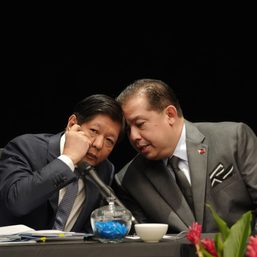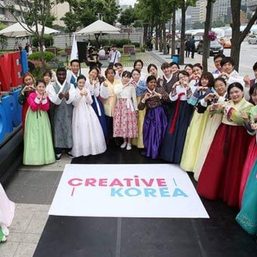SUMMARY
This is AI generated summarization, which may have errors. For context, always refer to the full article.

MANILA, Philippines – In 2011, Joji Alonso, an established executive producer in the Philippines, had her first shot at Oscars glory when comedy satire Ang Babae sa Septic Tank was submitted as the country’s representative to the 84th Academy Awards’ Best Foreign Language Film category.
She said her team received a P1-million donation from the Philippine Amusement and Gaming Corporation (Pagcor), as well as a humble amount from passionate supporters, as part of efforts to bring the film to the US.
But once they arrived in Los Angeles to campaign for their film, Hollywood slapped them with a bitter reality check.
“That money was nothing. We were just laughing at ourselves,” she said. “We were bringing with us a lot of pamaypay (Philippine hand-held fans) to give away to those who would attend our screenings and dinners. We heard in another venue, I would not mention which country, they were giving expensive watches and wallets. That film made it to the top five,” she said.
This awards season, the Philippines’ latest submission to the Academy – On the Job: The Missing 8 – failed to make it yet again to the Oscars’ shortlist. In fact, none of the dozens of films submitted by the country to the award-giving body sporadically since 1953 became a finalist.
Some lawmakers have begun asking why.
House Deputy Speaker Camille Villar filed a resolution – which was taken up by the lower chamber’s creative industry panel on Tuesday, January 10 – seeking to assess the plight of Philippine cinema, with the intention of maximizing efforts to secure the country’s first Oscar nomination, among other goals.
“I believe it is high time that we give those working in the industry the worthy attention they deserve,” she said.
Campaigning for the Oscars
One who seeks to put the Philippines on the Oscars map must first understand that while the quality of the film is of prime consideration, it’s not the sole variable that leads to a coveted nomination. All the stars have to align, such as the political climate and the cultural zeitgeist working in their favor.
But dreamers must have deep pockets too.
“I was made aware by Liza Diño during her tenure in the Film Development Council of the Philippines that to actually campaign for the Oscars, you need money, resources, investments from governments in terms of ad spend, junkets, dinners, and all these PR activities,” said House creative industry panel chairman Christopher de Venecia.
He’s right. A 2016 Variety report said major studios shell out up to $10 million to woo Oscar voters. Alonso’s war chest in 2011 – around $18,200 when converted – did not stand a chance.
“No matter how many dinners we have, P10,000 (~$182) per plate, that won’t suffice for any film coming from our country to even make a small mark in the Oscar buzz,” Alonso said. “The bottomline is it should not be left to the producer to fend for themselves. We badly need the support of the government.”
Benefiting from Oscar success
But why does getting recognition from the Academy – an exclusive club sometimes criticized for lack of diversity among its members – even matter?
In Hollywood, Oscar nominations often translate to a box office bump. Awards columnist Pete Hammond said it best: “Getting nominated is just good for business.”
Resource speakers from the film industry who were invited by the House of Representatives agreed.
“Once you’re recognized globally in terms of cinema, it’s not only the talent that is recognized, but the whole country. This affects tourism and cultural sectors,” said Paolo Villaluna, president of the Directors’ Guild of the Philippines Incorporated (DGPI).
“Let’s say a Korean film gets recognized. Now you have an influx of tourists going into the country, trying to figure out where they shot the film, what they ate, why their culture is like that,” he added. When Parasite won Best Picture in the Oscars in 2020, backdrops used in the film saw a boost in tourism.

In recent years, Philippine films have bagged trophies in the world’s most prestigious film festivals, such as in Cannes, Berlin, and Venice. But DGPI’s former president Carlos Siguion-Reyna argued that the Academy Awards is still different.
“The Oscars is like the mainstream version of these prestige events,” he said.
Beyond the Oscar aspirations
For other resource speakers, the conversation should put more emphasis on the survival of the industry.
Their concerns pile up: from the lack of sufficient funding for the Film Academy of the Philippines to the increasing inaccessibility of the cinema experience, with tickets costing around P400 apiece.
Veteran filmmaker Jose Javier Reyes said that beyond making it to the Oscars stage, the goal should be fostering an environment that empowers filmmakers “to do work that is Oscar-worthy.”

“The diversity of the products we create can only come about if the producers are given the opportunity to do works outside the usual molds, which tend to limit the kind of materials in our insular territory,” Reyes said.
Tuesday’s discussions were ignited by the international awards traction that Filipino actress Dolly de Leon has been receiving for her captivating turn as luxury yacht toilet cleaner in the European film Triangle of Sadness. Awards season experts have said they see a path to her Oscar nomination.
Before her breakout role though, the 53-year-old artist was a bit player most her life in the Philippines, an actress who had to juggle multiple side-gigs aside from acting in order to put food on the table.
In interviews, she expressed hopes that the momentum she has been getting would transform the Philippine entertainment scene for the better.
“There are many great filmmakers, but they just don’t have the wings to fly because they’re held back by management and producers who are shortsighted,” De Leon said in an interview with Esquire.

It is unclear yet what kind of legislative proposals would come out from the congressional inquiry, but De Venecia’s panel intends to meet two more times to zero in specifically on the struggles of the film industry.
“If we’re going to be demanding that amount from the Department of Budget and Management and economic cluster of Malacañang [for an Oscar campaign], we need to justify the return on investment on it,” De Venecia said.
Reyes asserted the government should go beyond lip service this time, and truly address the root problems.
“I am overwhelmed by the success of Dolly de Leon, but isn’t it sad that she is being recognized for a Swedish movie?” he asked. “It took a Swedish director to discover a seemingly anonymous, ultra-talented actress to be brought into international recognition. That is the irony that we need to change now.” – Rappler.com
1 comment
How does this make you feel?
![[OPINION] Is the MMFF ready for rebirth of Philippine cinema?](https://www.rappler.com/tachyon/2022/12/mmff-rebirth-philippine-cinema-December-29-2022.jpg?fit=449%2C449)















I agree that funding matters a lot. Just ask the Koreans, who won with “Parasite”. Thanks to government funding. Sadly, the Philippine government’s pocket is shallow and leaky.
Aside from funding, a country’s economic clout matters too. Eight of the nine countries with at least three Oscar wins are affluent; the 15 with at least two Oscars have GDP/PPP ratios greater than the Philippines’s. But there is more to winning than dollars.. Vietnam is only marginally richer and has much less Hollywood exposure than the Philippines. Yet it already has three nominations despite having just 17 entries since 1993 (versus 32 since 1953 for the Philippines).
I watched a Philippine entry to a recent overseas film fest. My observations? The plot was predictable; the cinematography had a low-budget feel; the protagonist’s lines were often mawkishly sentimental. Its worst sin? Slapstick comedic moments. After watching more films, to the delight of my wife, I concluded that those products are way below the creative bandwidth and technical prowess Filipinos are capable of. No less than Lee Kwan Yu said: “Filipino professionals whom we recruited to work in Singapore are as good as our own. Indeed, their architects, artists, and musicians are more artistic and creative than ours.” The local film industry has the human assets needed to win an Oscar. It just needs to be shaken out of its insanity — doing the same thing again and again and each time expecting a different result.